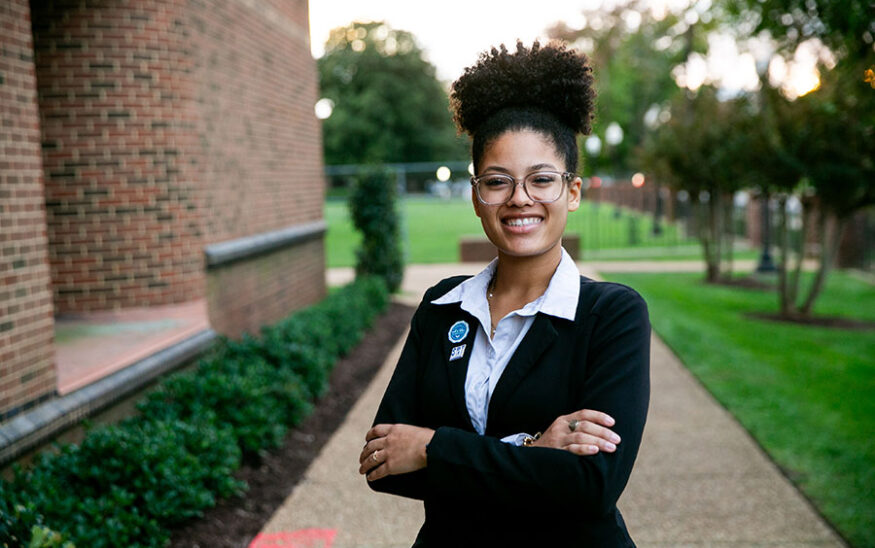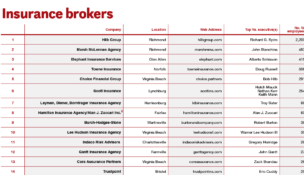
A Hampton University junior majoring in accounting, Jasmine Tillery plans to work at an accounting firm while studying for the CPA exam. Photo by Kristen Zeis

A Hampton University junior majoring in accounting, Jasmine Tillery plans to work at an accounting firm while studying for the CPA exam. Photo by Kristen Zeis
Future accountants have new path to certification
Beth JoJack //November 2, 2025//
Summary
- Starting in 2026, Virginia will no longer require 150 college hours for CPA licensure.
- Candidates with bachelor’s degrees can become CPAs after two years of work and passing the exam.
- The Virginia Society of CPAs pushed for the change to address staffing shortages.
Virginia will soon offer a new path to becoming a certified public accountant.
Beginning in 2026, prospective accountants will no longer be required to earn 150 hours of college credit to become licensed CPAs. People with bachelor’s degrees — having completed 120 hours, including required accounting coursework — will be able to become CPAs after working in the field for two years and passing the certification exam.
The change was a big topic of conversation this summer, says Jasmine Tillery, a Hampton University junior who interned at the Richmond office of EY, the Big Four accounting firm also known as Ernst & Young.
“It makes it much easier on us to be recruited,” she says.
For now, Tillery’s plan is to work at an accounting firm after graduating and study for the certification exam. Some firms, Tillery notes, hand out a bonus for passing.
“I’d be able to be eligible for that sooner as well,” she says.
Contending with staffing shortages throughout the accounting industry, the Virginia Society of Certified Public Accountants (VSCPA) pushed mightily for Virginia to develop a route to licensure that didn’t require 150 hours.
“We basically drafted language, took it to the [Virginia] Board of Accountancy, gave them the opportunity to provide input into it and then found patrons and moved forward on it,” explains Emily Walker, the association’s vice president of advocacy and pipeline.
Gov. Glenn Youngkin signed the legislation in March, and it takes effect at the start of 2026.
Creating the new pathway, advocates hope, will lead to an increase in the number of college students going into accounting. That’s key since more than 300,000 accountants nationwide left the field between 2019 and 2022, according to The Wall Street Journal.
The U.S. Bureau of Labor Statistics projects employment of accountants and auditors will grow 5% from 2024 to 2034. About 124,200 job openings are projected each year over the decade.
In Virginia, the number of new CPA licenses issued has fallen about 34% since fiscal 2008, when 1,434 licenses were issued, to 940 in fiscal 2024, according to the Virginia Board of Accountancy.
Mandy Nevius, human resources director at Glen Allen firm Keiter, calls the new pathway “a wonderful thing. I’ve been wanting it to happen for years.”
Getting young people interested in accounting is a tall order for several reasons. For one thing, many high schools no longer offer accounting classes, Nevius says. “People don’t even know about this career.”
And then there’s the no-fun image, she adds. Young people may picture accountants as humorless drones in windowless offices staring at spreadsheets. “The pocket protector, all those horrible stereotypes,” Nevius says.
In reality, though, accountants are professionals who can understand complex information and are skilled at explaining that data to clients. “They’re helping people,” she notes.
Even students who are open to the multitude of opportunities available in accounting still face financial hurdles, including the $1,200 cost of the CPA exam and prep courses that range from $2,000 to $5,000. Adding 30 extra credits on top of a bachelor’s degree was a bridge too far for some financially strapped students.
“There’s definitely a shortage of people coming into the profession,” confirms Melissa Sikes, a partner at the Glen Allen office of Brown Edwards, a Roanoke-based accounting firm that’s among the nation’s top 100 by net revenue.
With everyone desperate to prime the pipeline, VSCPA received little pushback to the idea of dropping the 150-credit requirement, Walker says.
Having a choice
When God created heaven and earth, accountants weren’t required to earn 150 credit hours.
In 1929, New York became the first state in the nation to require certified public accountants to earn a college degree. Other states followed.
Requirements changed again in the late 1980s after 84% of the voting members of the American Institute of Certified Public Accountants supported a plan to require new members to have 150 credit hours. States, including Virginia, began requiring the additional coursework. In 1999, the General Assembly passed a bill requiring that, starting in 2006, all CPAs would have to have 150 hours of college credits.
In 2008, the National Association of State Boards of Accountancy explained the rationale for requiring 150 credit hours, citing factors for the change that included “the recognition of accounting as a profession at least as demanding as law, engineering and architecture.”
The idea, says Dawn Schwartz, assistant professor of accounting at Longwood University, was to make accountants more professional.
“They thought if they raised the credit hours that maybe people would get graduate degrees, and that means we would have more mature decision-makers,” she says.
Initially, Marc Lebow, assistant professor at Hampton University, supported Virginia’s addition of 30 hours. He thought getting additional coursework that examined “higher-level” accounting concepts would be good for students.
When he saw Virginia’s actual requirements, however, Lebow realized the extra credits didn’t have to be in accounting.
“It was just you had to have 150 hours,” says Gary Wallace, managing partner at Keiter. “The joke was always you could do basket weaving and still qualify.”
Today, Lebow supports the creation of a new pathway to becoming a CPA, but he notes that there may be a downside he hasn’t considered yet.
“When it was 120 going to 150, I only saw the good parts,” he says. “Coming from 150 back down to 120, I’m looking at the good parts.”
Would-be accountants still have choices. Those who earn a master’s degree or take 30 additional college credit hours are required to work only one year in accounting.
Everyone must still pass the CPA exam, though.
Carter Regitz earned his master’s degree in accounting from James Madison University two years ago. He then went to work as a senior accountant at Hantzmon Wiebel, a Charlottesville accounting firm.
He isn’t mad that Virginia accountants will soon be able to become CPAs with only a bachelor’s degree. For him, graduate school provided a deeper understanding of the profession; it was worth it.
A bonus: Regitz was able to take one of the four sections of the CPA exam while he was at JMU.
“That’s where doing the master’s was kind of nice, because you can start sitting and taking the exams,” he says.
As for Wallace, he believes earning a master’s degree from the University of Virginia served him well. “I got a master’s because I wanted to specialize in tax. For specialty-type services, I can see the benefits.”
Still, different paths suit others, Wallace notes. Accountants could learn the same things by working with a sharp professional.
When Sikes earned her certification in 2003, she wasn’t required to do the additional 30 credit hours.
She’s confident that those extra classes wouldn’t have made her a better accountant, because courses often focus on theory as opposed to practice, especially in auditing, Sikes says. “That’s done when you go out in the field,” she notes.
Another thing to consider: Just because an accountant opts to get their CPA after earning their bachelor’s degree doesn’t mean they’ll skip graduate school. Tillery plans to pursue a master’s in data analytics with a focus on artificial intelligence to further her career.
At the end of the day, no matter what route professionals take to become CPAs, they have to have a solid understanding of the job, from auditing to taxation.
“People are still going to have to take that exam and pass it,” Sikes says.
Graduate programs in question
Roger Martin, senior associate dean for academic programs at the University of Virginia’s McIntire School of Commerce, thinks that the new pathway to becoming a CPA is a win for students overall and could be for universities as well.
More undergrads may sign up for U.Va.’s accounting program in the commerce school, Martin says, but the question is how the new standard would affect the master’s program. “I think every school I know is trying to figure out what the impact on their master’s program [will be].”
Longwood’s MBA program with an accounting focus, which launched last year, could be undersubscribed, Schwartz says: “It’s possible that that’s not going to be as successful as we thought it would be.”
Martin says the challenge for universities is showing students how they can benefit from accounting master’s degrees in addition to developing skills at work. U.Va., he adds, can make the case that master’s students develop professional skills before entering the industry.
“We have a leadership course,” Martin says. “We have a policy course that really is intended to get that technical accounting student out of the weeds of accounting, to get them to think about the role of accounting and their role as a professional and how they’re going to develop and excel quickly in their careers.”
As of now, the jury is still out on how Virginia’s new path to becoming a CPA will impact accounting master’s programs, but some Virginia professionals already see evidence that the change is drawing more students to the profession.
Keiter typically has between 30 and 35 interns a year, according to Nevius. Additionally, it hires between eight and 16 new graduates.
To make sure the firm can fill those slots, its employees attend events at about a dozen Virginia universities each year. From the visits Keiter employees have made already this fall, they’re confident the new path to becoming a CPA will help ease the staffing shortage.
“We have seen more entry-level students looking for jobs than we have in the past several years,” Nevius says.
Last year, Keiter recruiters saw between three and five students actively looking for jobs at the firm, and this year as of October, the firm has talked with about 30 students.
“I’m not going to say it’s huge, but it’s significant,” Nevius says.
P





















